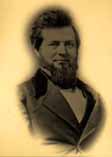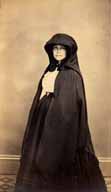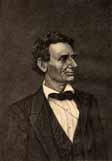

 |
 |
|
During the Civil War many of the soldiers became sick, and many were wounded in battle. It was hard for them to get well in crowded hospitals far from home. Governor Louis Harvey worried about the boys from Wisconsin. Finally he decided to go south to see what he could do to help them. On the journey, while he was passing from one boat to another, his foot slipped and he fell into the water and was drowned. The news saddened the people of Wisconsin. It saddened his wife most of all, but she went ahead with the war work she knew he wanted done. "Wisconsin Angel" the sick soldiers called this tall, strong, black-robed nurse. She visited the hospitals, cheered the wounded, and learned their needs. She felt that they would get well faster if they could be in less crowded hospitals nearer their own homes. So she went to see President Lincoln. Mr. Lincoln welcomed her, but he did not smile. There were deep lines of care around his eyes. He listened to Mrs. Harvey tell of the need for a Wisconsin hospital, but he did not agree with her. He sent her to the secretary of war and told her to come back the next day. The next morning Mrs. Harvey said to Mr. Lincoln, "Mr. President, have you decided?" "No," said the president, "but I think this idea of northern hospitals is all foolishness. I am tired of hearing about it." "I am sorry to have made things harder for you," said Mrs. Harvey. "I would rather have stayed at home." The president smiled and said, "I wish you had." Mrs. Harvey went on. "Mr. President," she said, "I felt it was my duty to come to you, and I believe you will be grateful for my coming. The people at home cannot understand why their friends are left to die when, with proper care, they might live and do good for their country. Mr. Lincoln, I know that most of these sick men would get well again if they might be sent north." Mr. Lincoln frowned and said, "You talk as if you thought you knew more about this than I do." Mrs. Harvey fought back the tears that rushed to her eyes and said, "I mean no disrespect, but it is because I know what you do not know that I have come to you." A look of sadness came over Mr. Lincoln's face. He said nothing. Mrs. Harvey rose. "Have you decided?" she asked. "No," the president replied. "Come back tomorrow. Come at twelve." Next day Mrs. Harvey waited--one hour--two hours--three hours. The president was busy. The Cabinet was having a meeting. A message came. She was to wait. Mr. Lincoln would come soon. At last she heard his quick, shuffling footsteps. He came toward her. "I am sorry to have kept you waiting," he said. "I only wish to tell you that I have given an order for your hospital." At first Mrs. Harvey could not speak. Then she said, "I thank you in the name of thousands who will bless you for this act." Then, tearfully, she added, "Do you mean, really and truly, that we are going to have a hospital now?" The president laughed and said, "Yes, Mrs. Harvey, and I shall name this first hospital for you." "Mr. Lincoln--could you--would you name it for my husband instead?" "If you wish. It will be called the Louis Harvey Hospital." Then he laughed
and added, "You almost think me handsome now, don't you?"
Mrs. Harvey laughed too. "You are perfectly lovely
to me, Mr. Lincoln," she said. So Abraham Lincoln listened to Wisconsin's Angel. Northern
hospitals were built to care for the wounded soldiers of the Union Army.
|
 Louis Harvey |
 Cordelia Harvey |
|
 Abraham Lincoln |